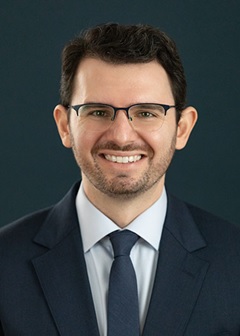 Alex Terry
Alex Terry
Education:
B.A. University of Chicago (2014)
Ph.D. University of Illinois-Chicago (2022)
Current Position:
8th Year MSTP
4th Year Medical Student
Advisor:
Dr. Nissim Hay (UIC)
Graduate Program:
Biochemistry and Molecular Genetics (UIC)
Research Interest:
Since college, I have been interested in cancer metabolism, specifically understanding how tumor cells alter their metabolism to promote survival during nutrient deprivation. My undergraduate work focused on BNIP3, a mitophagy-adaptor protein, in hepatocellular carcinoma. In my graduate work, I studied CD36, a membrane protein implicated in the transport and utilization of lipid substrates. We found that CD36 supports lipid homeostasis through selective uptake of mono-unsaturated fatty acids (MUFAs). This function appears to be most important in settings when endogenous production of MUFAs is inhibited, or when exogenous saturated fatty acids are more abundant (e.g. obesity). Beyond cancer biology, I have also spent considerable time thinking about how Cas9 and sequential activation of guide RNAs can control lineage determination during differentiation.
Publications:
Damian E. Berardi, Althea Bock-Hughes, Alexander R. Terry, Lauren E. Drake, Grazyna Bozek, and Kay F. Macleod. Lipid droplet turnover at the lysosome inhibits growth of hepatocellular carcinoma in a BNIP3-dependent manner. Science Advances (Accepted).
Md. Wasim Khan, Alexander R. Terry, Medha Priyadarshini, Vladimir Illievski, Zeenat Farooq, Grace Guzman, Jose Cordoba-Chacon, Issam Ben-Sahra, Barton Wicksteed, and Brian T. Layden. The hexokinase “HKDC1” interaction with the mitochondria is essential for liver cancer progression. Cell Death and Disease 13(7), 660 (2022).
Catherine S. Blaha, Gopalakrishnan Ramakrishnan, Sang-Min Jeon, Veronique Nogueira, Hyunsoo Rho, Soeun Kang, Prashanth Bhaskar, Alexander R. Terry, Alexandre F. Aissa, Maxim V. Frolov, Krushna C. Patra, R. Brooks Robey, & Nissim Hay. A non-catalytic scaffolding activity of hexokinase 2 contributes to EMT and metastasis. Nature Communications, 13 899 (2022).
Milad J. Alasady, Alexander R. Terry, Adam D. Pierce, Michael C. Cavalier, Catherine S. Blaha, Kaylin A. Adipietro, Paul T. Wilder, David J. Weber, & Nissim Hay. The calcium-binding protein S100B reduces IL6 production in malignant melanoma via inhibition of RSK cellular signaling. PLoS One, 16(8), e0256238 (2021).
Ryan Clarke, Alexander R. Terry, Hannah Pennington, Cody Hasty, Matthew S. MacDougall, Maureen Regan, & Bradley J. Merrill. Sequential Activation of Guide RNAs to Enable Successive CRISPR-Cas9 Activities. Molecular Cell, 81(2), 226–238.e5 (2021).
Majd M. Ariss, Alexander R. Terry, Abul B. M. M. K. Islam, Nissim Hay, & Maxim V. Frolov1. Amalgam regulates the receptor tyrosine kinase pathway through Sprouty in glial cell development in the Drosophila larval brain. Journal of Cell Science 133, jcs250837 (2020).
Alexander R. Terry & Nissim Hay. Fuelling cancer cells. Nature Reviews Endocrinology 15, 71–72 (2019).
Carolina M. Pusec, Adam De Jesus, Md Wasim Khan, Alexander R. Terry, Anton E. Ludvik, Kai Xu, Nicholas Giancola, Haaris Pervaiz, Emily Daviau Smith, Xianzhong Ding, Stephen Harrison, Navdeep S. Chandel, Thomas C. Becker, Nissim Hay, Hossein Ardehali, Jose Cordoba-Chacon, & Brian T. Layden; Hepatic HKDC1 Expression Contributes to Liver Metabolism, Endocrinology 160:2, 313–330 (2019).